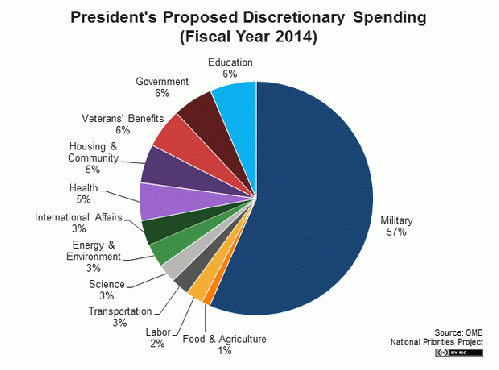The omnibus military spending bill known as the National Defense Authorization Act (NDAA) rolled out of the House Armed Services Committee pulling a trailer load of amendments and barreling down an increasingly potholed road. In the same week as news broke of massive school closings in Chicago and Philadelphia for lack of funding, only two members of the committee, California representatives Jackie Speier and John Garamendi, had the presence of mind to vote "no" on $637.5 billion more for drones, nukes, and missile "defense" in FY2014.
The NDAA will now make its way through a House of Representatives packed with liberals and conservatives who take massive campaign contributions from military contracting firms. Democrats will take their lead from President Obama, who proposed the $1.15 trillion annual budget that includes a whopping 56.5% military share of the discretionary spending pie.
Source: NationalPriorities.org by National Priorities Project
The House Armed Services Committee also passed a "Sense of Congress" endorsement of a continued U.S. military presence in Afghanistan after 2014 as well as ongoing funding for the Afghan Security forces. Thus the U.S. "withdraws" from Afghanistan.
Why does Congress keep voting for military spending when the U.S. is supposedly so broke?
Here's how it works in one state: Maine. Members of Congress from both sides of the aisle applauded the Navy's contract to General Dynamics / Bath Iron Works to build four of nine new destroyer ships that will cost taxpayers $6 billion. Jobs are scarce, and military contracting is ever presented as a viable jobs program. Republican Senator Susan Collins celebrated the destroyer ship contract, too, and also says she wants Maine to host a missile "defense" base because of the jobs it would generate. Meanwhile Maine's Attorney General, Democrat Janet Mills, supports building a drone testing site because drones are "an economic driver." Military spending is a bi-partisan affair.
It is almost as if they have never seen the landmark study by economists at the University of Massachusetts, " The U.S. Employment Effects of Military and Domestic Spending ," demonstrating that investing in any other sector produces more jobs than investing in building weapon systems. Funding education, manufacturing energy efficient home components or light rail systems -- even just giving taxpayers a rebate in cash to spend -- generates up to twice as many full-time, full-benefit jobs as building weapons does. It is almost as if members of Congress have stopped listening to the people, who consistently prioritize spending on education and health care, and fixing roads and bridges, over spending on weapons and wars.
In every state in the union the people suffer from high unemployment, budget cuts to essential services, and representatives who keep the pork barrels rolling by voting yes on NDAA each year. As military spending has continued to gobble up more than half the federal spending pie every year of the Obama administration, economic conditions have continued to deteriorate for the majority of people in the U.S.
According to the U.S Census, 13 percent of people in the U.S. now live in poverty. Children fare even worse: 1 in 6 live below the federal poverty line. Not just inner cities but also suburbs now sow extreme income inequality. People of color are suffering disproportionately from food insecurity and foreclosures. Job growth following the financial crisis of 2008 occurred almost entirely in sectors where workers do not make a living wage, and economic migration to the U.S. has slowed. Entire generations are struggling with historically high levels of debt for education.
How broke do we have to be before Congress really reduces military spending? It's past time to bring our war dollars home and put them to work meeting people's needs.
Austerity is no basis for true security.
Co-author Janet Weil is a CODEPINKer and retired adult education teacher who lives in California and tweets from @wardollarshome.






